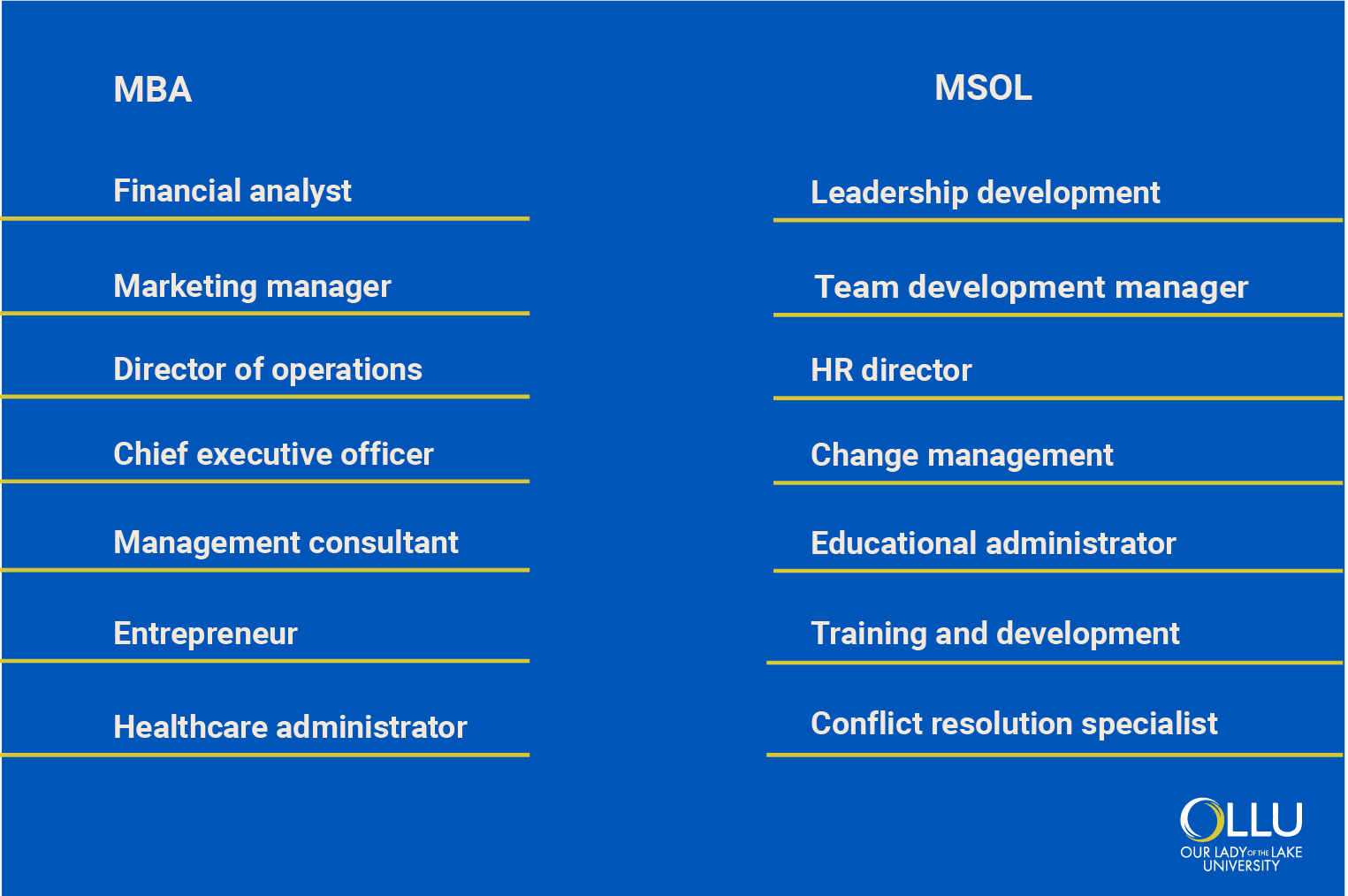MBA vs. Master’s in Leadership: Which One’s Right for You?
Oct 18, 2023

Are you a seasoned professional contemplating a transformative leap into leadership or management roles? Or have you recently completed your undergraduate studies and are looking to accelerate your career growth by gaining advanced business knowledge and skills? Well, in both cases, the landscape of higher education has evolved, presenting two distinct paths for you: the MBA and the specialized MSOL.
You may have encountered these terms, but understanding their distinctions and which aligns better with your goals can be challenging. So, read on as we explore the MBA vs. master’s in organizational leadership dilemma and focus on crucial aspects like curricula, job opportunities, potential salaries and more.
Understanding the Basics
Before jumping into the intricacies of the master’s in organizational leadership vs. MBA debate, we must first understand the fundamental attributes of each degree.
MBA
MBA stands for Master of Business Administration, a postgraduate degree program encompassing various business-related subjects. Such programs generally adopt an analytical approach to management, emphasizing subjects such as finance, accounting, marketing and statistics. They are tailored for individuals aspiring to progress into executive or managerial roles within their organizations.
For example, our MBA program is designed to let accomplished managers keep advancing in their careers without having to pause their work. This helps them stay competitive in today’s complex economy. The program is ideal for mid-level and senior managers in various industries.
Although some MBA programs offer specializations in organizational leadership, the primary aim of such programs is to provide a general understanding of how businesses operate at a fundamental level.
MSOL
MSOL, which stands for Master of Science in Organizational Leadership, represents another postgraduate degree program focusing on developing advanced leadership skills. Unlike MBA programs, MSOL puts a greater emphasis on understanding organizational dynamics.
MSOL programs typically focus on leadership theory, organizational behavior, change management, team dynamics and communication strategies, as they are designed to prepare individuals for leadership roles in various industries and organizations. Thus, they equip their students with the knowledge and skills needed to lead teams effectively, drive organizational change and achieve strategic goals by emphasizing more personal and creative approaches to management.
For example, our MSOL program aims to achieve three main objectives:
- To offer advanced leadership training to talented professionals who aspire to take on greater responsibilities in various fields such as business, education, healthcare and public service, both locally and nationally.
- To create a platform for multidisciplinary master’s level education that encourages the cultivation of a global outlook.
- To play a significant role in applying knowledge to executive leadership, policy formulation, research and community service, thereby making substantial contributions to these areas.
Curriculum Differences
To begin the comparison between MSOL vs. MBA, we’ll analyze their respective curricula. This approach allows us to discern the similarities and differences between the two degrees.
MBA
The curricula of MBA programs are known for their direct approach to business management, providing students with a diverse skill set to excel in leadership roles through courses such as:
- Business Law
- Technology & Information
- Business Study Tour
- Ethical Leadership & Governance
- Business Consultation
- Business Current Topics
- Managerial Control Systems
- Strategic Human Resources Management: Policies and Practices
- International Study Tour
- Effectual Entrepreneurship
MSOL
The curricula of MSOL programs also include courses related to leadership. However, they mainly focus on organizational dynamics through courses like:
- Introduction to Leadership Theories
- Critical Thinking and Problem Analysis for Leaders
- Introduction to Leadership Research Methods
- Leadership Strategies and Processes
- Readings in Leadership
- Written Communication for Leaders
- Conflict Management for Leaders
- Synthesis of Leadership Research Theories
- Leadership Decision Making
- Multicultural Issues in Leadership
Career Opportunities

Next, we will further our comparison between organizational leadership vs. MBA by exploring the diverse career opportunities afforded by each of these distinct academic paths.
MBA
As an MBA graduate, you can pursue various careers, such as:
- Financial analyst—assessing financial data, conducting market research and providing insights for investment decisions.
- Marketing manager—developing and executing marketing strategies to promote products or services, overseeing campaigns, analyzing market trends and working to enhance brand visibility and sales.
- Director of operations—optimizing day-to-day activities, ensuring smooth processes and managing resources to meet business goals.
- Chief executive officer—making major corporate decisions, setting strategic goals and representing the organization to stakeholders.
- Management consultant—providing expert advice to businesses on various aspects, including strategy, operations and organizational structure, analyzing challenges and offering solutions for improvement.
- Entrepreneur—initiating and building your own businesses, developing innovative ideas, securing funding and navigating the challenges of starting and growing a company.
- Healthcare administrator—managing the operations of healthcare facilities, overseeing staff, budgets and compliance with healthcare regulations to ensure quality patient care.
MSOL
Likewise, there are various career paths you can pursue with an MSOL degree, such as:
- Leadership development specialist—designing and implementing programs to cultivate leadership skills, conducting assessments and providing feedback for improvement.
- Team development manager—fostering team collaboration, providing coaching and feedback and facilitating skill development for improved performance.
- HR director—focusing on leadership development, designing and implementing leadership development initiatives and ensuring compliance with employment laws.
- Change management consultant—developing change strategies, conducting stakeholder engagement and implementing plans to navigate organizational transitions.
- Educational administrator—providing leadership in educational institutions, overseeing curriculum development, managing staff and ensuring compliance with academic standards.
- Training and development manager—designing and delivering training programs, assessing learning needs and measuring the effectiveness of training initiatives.
- Conflict resolution specialist—mediating conflicts, facilitating communication and implementing strategies to resolve disputes constructively.
Skill Sets and Traits for Success

Success in both business administration and organizational leadership relies on your acquired skill set and personal attributes. Therefore, it’s crucial to develop the necessary skills and abilities that align with your aspirations.
MBA
An MBA equips you with an array of skills and qualities that position you for success in the highly competitive landscape of business and management. By completing this esteemed program, you will:
- Master the intricacies of financial analysis and budgeting, allowing you to make informed financial decisions.
- Develop the strategic acumen needed to formulate and execute long-term plans that align seamlessly with organizational objectives.
- Hone your negotiation skills to effectively broker deals and resolve conflicts.
- Gain competency in conducting comprehensive market research and extracting actionable insights from data.
- Learn how to meticulously plan, implement and oversee complex projects from inception to completion.
- Acquire the leadership qualities required to inspire, lead and manage high-performing teams.
- Cultivate an innovative mindset and entrepreneurial skills, preparing you to disrupt markets and create new business ventures.
MSOL
Choosing an MSOL program is an investment in your leadership capabilities and understanding of complex organizational dynamics. By completing this specialized course, you will:
- Engage in a journey of continuous self-improvement, fostering personal and professional growth.
- Become an expert in navigating and facilitating organizational change, equipping you to lead transformations with confidence.
- Develop the skills to resolve conflicts and mediate disputes in ways that enhance understanding and strengthen interpersonal relationships.
- Cultivate the ability to envision long-term objectives and strategically formulate plans to achieve them.
- Enhance your communication and collaboration skills, enabling you to lead and participate in high-performing teams.
- Uphold a commitment to ethical leadership practices, ensuring you navigate business challenges with integrity.
- Gain a nuanced understanding of global markets and international business dynamics, empowering you to excel in leadership roles across diverse and multicultural contexts.
Financial Considerations
If you are considering pursuing either degree, it is essential you understand the financial aspects of each path you follow.
Data indicates that in the United States, professionals in business administration earn an average total pay of $61,319 annually, with salaries ranging from $41,000 to $81,000 per year. Conversely, professionals in the organizational leadership sector can expect even higher wages, with an average total pay of $124,323 annually and salaries ranging from $95,000 to $165,000 annually.
It’s important to note that these figures are subject to various factors such as specialization, years of experience and geographic location. For instance, an MBA could pave the way for a position as a chief executive officer (CEO), where the annual compensation can exceed half a million dollars.
Future Outlook
According to recent data from the Bureau of Labor Statistics, the outlook for management occupations encompassing various roles in finance, administration and leadership is highly promising. Projections indicate that this sector is anticipated to experience a growth rate surpassing the average for all occupations between 2022 and 2032, with an estimated average of 1.1 million job openings annually, showcasing a high demand for skilled professionals in these positions.
Key Considerations When Choosing a Degree
Before committing to either an MBA or MSOL program, you should take into account the following factors that can significantly shape your educational journey:
Flexibility
If you have other commitments but still want to further your education, the flexibility of a program becomes paramount. Our institution is consistently recognized as one of the top schools offering outstanding master’s programs, including a weekend program.
Interests and goals
Having a clear understanding of your long-term goals can make choosing a degree program that aligns with your aspirations easier. For instance, if you have a specific industry or job position in mind, selecting a program with relevant coursework and specialized knowledge in that field is best.
Job market
Researching employment prospects in your chosen field and geographic area can provide valuable insights, as specific sectors may offer better opportunities than others.
Educational prerequisites
It’s also essential to carefully review academic requirements for any role you are interested in. Keep in mind that certain positions may require specific degrees, majors or certifications.
Curriculum
Lastly, make sure that the program you want to pursue includes a diverse set of courses that are crucial for your development and learning. This way, you’ll have a solid foundation to build on for your future career.
The Bottom Line
While the debate over whether leaders are born or made continues, we firmly believe that leadership and management skills can be developed and refined. Our commitment is to empower individuals like you to succeed in management and leadership, regardless of your starting point. With our exceptional master’s programs in both MBA and MSOL, along with a dedicated Ph.D. program in leadership, we provide a comprehensive platform to nurture and enhance your abilities. Join us, and together, we can lead the way!
FAQ
Is a master’s in organizational leadership worth it?
Yes, certainly! An MSOL degree ensures improved leadership skills and leads to excellent career opportunities.
What can you do with a master’s in organizational leadership?
You can pursue various leadership roles such as leadership development specialist, change management consultant, team development manager, etc.
Is organizational leadership a business degree?
Although it overlaps with some components of a traditional business degree, an MSOL degree focuses on the human aspects of leadership within a business context.
Is an MBA worth it for leadership?
Yes, an MBA is highly valued in business and extremely beneficial for entrepreneurship.
Which is better: MBA or MSOL?
It depends on your career goals and desired role.
Which pays more: MBA or MSOL?
On average, organizational leadership offers higher salaries. However, specific MBA-related roles have much higher earning potential.
Which degree offers a more promising future: MBA or MSOL?
They both offer promising futures, with a positive job outlook throughout the decade.
Which degree is harder: MBA or MSOL?
Both have challenges, but the difficulty may vary based on personal strengths and interests.
Which degree is cheaper: MBA or MSOL?
Costs vary widely between programs, depending on the institution where you pursue the degree.